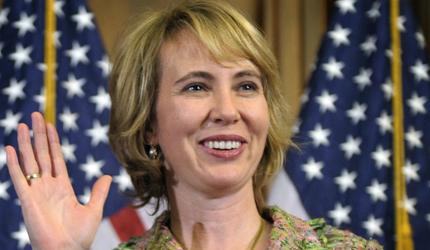By Paul Davenport
Associated Press
PHOENIX — U.S. Rep. Gabrielle Giffords’ decision to resign from Congress sets up a political free-for-all in her competitive southeastern Arizona district, with voters set to pick a temporary replacement and then a full-term representative in rapid succession.
As Giffords, critically injured in a mass shooting last year, steps out of the public eye this week to focus on rehabilitation and recovery efforts, her departure thrusts Tucson into the national spotlight.
The three-term Democrat was heavily favored to be re-elected, so her decision to step down creates an opportunity for Republicans to pick up a seat in the House.
But holding onto Giffords’ seat has sentimental as well as symbolic value for Democrats as the elections will come as the presidential race intensifies — in a Red state that the Obama campaign is targeting.
Bruce Ash, Republican national committeeman for Arizona, said the upcoming special election “will be a bellwether probably for the November elections.”
Giffords was shot in the head as she met with constituents outside a Tucson supermarket on Jan. 8, 2011. Six people died and 13 were wounded, including Giffords.
She has made steady progress in her recovery, returning to the House chamber in August to cast a vote for the debt-ceiling compromise, but she still has difficulty speaking.
With both parties expected to target the race, “it means money. It means lots of national money,” said Carolyn Warner, Democratic national committeewoman.
Under a timetable set in Arizona law, Republican Gov. Jan Brewer will schedule the special elections — both a primary and a general — once Giffords leaves office and a vacancy is declared.
The primary is expected to be held in April and the general in June.
But only months later, there will be the regular primary election in August to pick nominees for the Nov. 6 election for the full two-year term that starts next January.
“We have no idea how this is going to go,” said state Rep. Steve Farley, a Democrat who said he had his sights on running for a state Senate seat but now is leaving open the possibility of a congressional race. “The dynamics are going to be very hard to predict.”In another twist, the district itself changes between the two elections, shedding some outlying areas of Tucson and including more of the central city.
The special election is for the 8th Congressional District. The regular election is for the 2nd District, recently renumbered and reconfigured under the once-a-decade redistricting.
“It’s going to complicate things for people who are running in that they have to run in both districts,” said Jim Kolbe, the Republican who held the congressional seat before Giffords.
Both versions of the district are regarded as competitive, but Democrats pick up a few percentage points in voter registration under the newer version to pull roughly even with Republican. Independents make nearly a third of the electorate.
Voter turnout typically is low in special elections, but the extra attention devoted to this campaign could spur participation, particularly among Democrats, who tend to vote at lower rates than Republicans, said Patrick Kenney, an Arizona State University political science processor.
And the circumstances of Giffords’ departure could provide a “sympathy vote” for a Democratic nominee with issue stances and ties to the area that are similar to the outgoing representative, Kenney said.
Several potential hopefuls said they were caught off guard by Giffords’ decision to resign and now have to quickly assess their options.
“It’s going to draw a lot names,” said state Sen. Frank Antenori, a Republican who may enter the race. He said he wants to consider polling results before making a decision, likely by the end of the week.
Other Republicans mentioned as potential candidates include 2010 nominee Jesse Kelly, sports broadcaster Dave Sitton and former legislator Jonathan Paton, who lost to Kelly in the district’s Republican primary two years ago.
On the Democratic side, it’s not known if Giffords will endorse a replacement.
Those mentioned as potential candidates include state Sen. Paula Aboud, Farley and fellow state Rep. Matt Heinz.
“A lot of us are,” Heinz said when asked whether he is considering a run for the seat. A Giffords endorsement would be big, Farley said. “That person is going to have an endorsement as having been chosen to carry out her legacy.”
Giffords’ husband, former astronaut Mark Kelly, in the past has quashed speculation that he might run. Republicans now control five of Arizona’s eight current U.S. House seats.
The state is getting a ninth seat thanks to post-census reapportionment.



